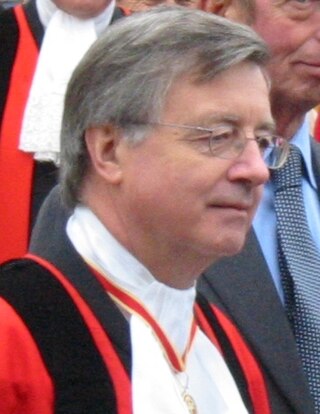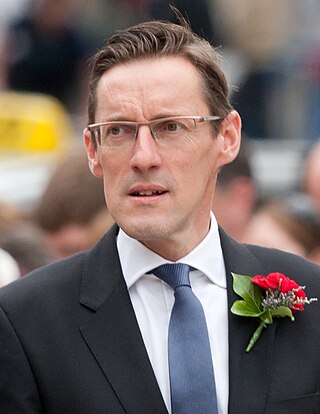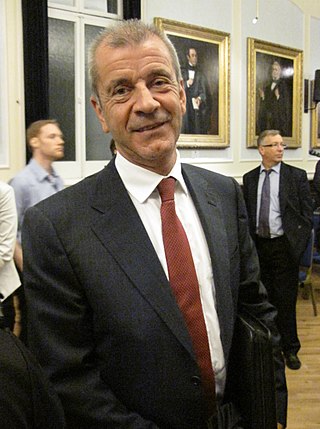Related Research Articles

Although the politics of Jersey has been largely based on independent parliamentary representatives, from time to time the island has had political parties. There are currently 3 active political parties in the island.
The Jersey Democratic Alliance was a political party in Jersey. JDA candidates contested general elections in 2005 and 2008 but announced in August 2011 that it would not be fielding candidates in the October 2011 elections.

Sir Philip Martin Bailhache KC is a Jersey politician and lawyer who has served as a Deputy for St Clement since 2022 and the leader of the Jersey Liberal Conservatives party.
Sir Peter Leslie Crill was Bailiff of Jersey from 1986 to 1991.

The Chief Minister of Jersey is the head of government of Jersey, leading the Council of Ministers, which makes up part of the Government of Jersey. The head of government is not directly elected by the people but rather by the legislature, the States Assembly.

Stuart Syvret is a former Jersey politician. He held elected office as a member of the States Assembly from 1990 to 2010. From 1999 to 2007, Svyret had executive responsibilities first as president of the Health and Social Services Committee and, after the 2005 constitutional reforms, as Minister for Health and Social Services in the Council of Ministers. He was dismissed from ministerial office in September 2007 and returned to the backbenches until he was disqualified from membership of the States in April 2010 due to his absence from the island. He has been involved in a series of legal proceedings, as a defendant in a criminal prosecution in Jersey and as a claimant in judicial review and civil claims in Jersey and London.
Guy de Faye is a former news presenter, and former member of the States of Jersey who was first elected in 2002 as Deputy, and re-elected in 2005.

Philip Ozouf is a Jersey politician representing the Parish of St Saviour in the States Assembly. He was a member of the States of Jersey from 1999 until 2018, serving as Economic Development Minister, Treasury and Resources Minister, and Assistant Chief Minister in the Council of Ministers. More recently he was Minister for External Relations and Financial Services.
Paul Vincent Le Claire is a Jersey politician who was a member of the States of Jersey from 1999 to 2011. He represented the Saint Helier District No.1 constituency and between 1999 and 2005 had an island-wide mandate as a senator.

Ted Vibert was a politician in the States of Jersey from 1999 to 2005.

Alan Simon Crowcroft is a Jersey politician, Connétable of St Helier, and former teacher. He has been an elected member of the States of Jersey since 1996.

Geoff Southern is a Jersey politician, and former teacher. He has been a deputy in the States of Jersey since winning a by-election, on 15 February 2002, and has chaired two scrutiny panels.
General elections were held in Jersey in two stages in October and November 2008.

Ian Joseph Gorst is a Jersey politician who has been a Deputy for St Mary, St Ouen and St Peter and Minister for Treasury and Resources since 2022.

The Council of Ministers is the collective decision-making body of the Government of Jersey, formed by the Ministers of the States of Jersey and the Chief Minister. The council co-ordinates policies and administration, especially policy affecting two or more ministers, prioritises executive and legislative proposals, and presents a "Strategic Plan for Jersey" for approval by the States Assembly.
Frederick John Hill, known as Bob Hill, is a Jersey politician and human rights campaigner. For 18 years he was Deputy for the parish of St Martin in the States of Jersey.

Francis du Heaume Le Gresley, MBE is a Jersey politician. He was a member of the States of Jersey between 2010 and 2014, after being first elected in the Jersey by-election of 2010. Prior to his political career he was the manager of the Citizens Advice Bureau in Jersey. He was the Minister for Social Security until 2014.

The judiciary of Jersey is a branch of the government of Jersey that interprets and applies the laws of Jersey, to ensure equal justice under law, and to provide a mechanism for dispute resolution. The Bailiff of Jersey is the President of the Royal Court. Individual trials are heard by the Bailiff, the Deputy Bailiff or a Commissioner. The Master of the Royal Court deals with some preliminary matters in civil cases. The Court is supported by the Judicial Greffier who acts as the registrar. In addition to the judge, the Royal Court includes a number of volunteer Jurats. The Jurats decide issues of fact in criminal and civil trials, hand down sentences in criminal trials and award damages in civil trials. All judges in Jersey are bound by a code of conduct, introduced in 2007, which requires them to "uphold the integrity and independence of the judiciary and perform their duties with competence, diligence and dedication".
References
- ↑ Walker, Carl (2011). "EU 'will reject zero-ten' – Centre Party". thisisjersey.com. Retrieved 4 September 2011.; Quérée, Ben (2011). "Centre Party 'to cut spending and fight GST'". thisisjersey.com. Retrieved 4 September 2011.; Anon (26 September 2005). "Party looks to streamline States". BBC News . London: BBC . Retrieved 4 September 2011.
- ↑ "Jersey Law | Students | Past Papers October 2005". Jersey Legal Information Board . 10 March 2006. Archived from the original on 27 September 2007.
- ↑ "Jersey senator quits ruling party". BBC News. 18 July 2005. Retrieved 4 September 2011.
- ↑ Anon (26 July 2005). "Party's members to choose chief". BBC News . London: BBC . Retrieved 4 September 2011.
- ↑ Jersey Evening Post, 20 July 2007
- ↑ Lewis, Anthony (2011). "Poll triumph for Senator Syvret and independent newcomers". thisisjersey.com. Archived from the original on 12 September 2012. Retrieved 4 September 2011.
{{cite web}}: CS1 maint: unfit URL (link); Quérée, Ben (2011). "No invites to the parties". thisisjersey.com. Retrieved 4 September 2011. - ↑ "Three more to stand for Centre Party". Jersey Evening Post . 2011. Archived from the original on 12 September 2012. Retrieved 4 September 2011.
{{cite web}}: CS1 maint: unfit URL (link) - ↑ Quérée, Ben (2011). "Unsuccessful candidates to try again". Jersey Evening Post . Archived from the original on 13 September 2012. Retrieved 4 September 2011.
{{cite web}}: CS1 maint: unfit URL (link) - ↑ "Party allows independent members". BBC News . London: BBC. 23 October 2005. Retrieved 4 September 2011.